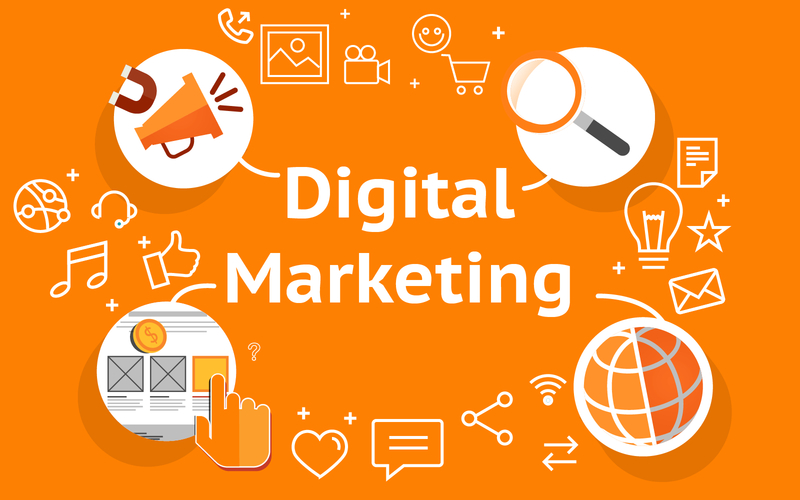In today’s technologically advanced world, digital marketing has emerged as a pivotal force that shapes the success of businesses across various industries. With the widespread adoption of the internet and digital devices, businesses have shifted their focus from traditional marketing methods to digital strategies that offer unparalleled reach, targeting capabilities, and measurable results. This article explores the multifaceted landscape of digital marketing, its key components, and the transformative impact it can have on business growth.

Understanding Digital Marketing
Digital marketing encompasses a broad range of strategies and techniques designed to promote products and services through digital channels. It involves leveraging various online platforms, such as search engines, social media, email marketing, content marketing, and paid advertising, to connect with target audiences and drive desired outcomes. Unlike traditional marketing, digital marketing provides businesses with the ability to precisely target their ideal customers, measure the effectiveness of campaigns, and optimize strategies in real-time.
The Key Components of Digital Marketing
- Search Engine Optimization (SEO): SEO focuses on improving a website’s visibility and organic search rankings. By optimizing website content, utilizing relevant keywords, and enhancing user experience, businesses can attract more qualified organic traffic and enhance their online presence.
- Pay-Per-Click Advertising (PPC): PPC advertising allows businesses to display ads on search engine results pages and other online platforms. With PPC, advertisers pay only when users click on their ads. This targeted approach helps generate immediate results and provides valuable data for optimizing campaigns.
- Social Media Marketing: Social media platforms like Facebook, Instagram, Twitter, and LinkedIn offer extensive opportunities for businesses to engage with their target audience, build brand awareness, and drive conversions. Effective social media marketing involves creating compelling content, fostering meaningful interactions, and leveraging paid advertising options.
- Content Marketing: Content marketing involves creating and distributing valuable, relevant, and consistent content to attract and retain a clearly defined audience. It helps establish thought leadership, build trust, and drive customer engagement. Blog posts, videos, infographics, and podcasts are some popular forms of content marketing.
- Email Marketing: Despite the rise of new communication channels, email marketing remains a highly effective tool for nurturing leads and building customer relationships. Personalized and targeted email campaigns can drive conversions, increase customer loyalty, and generate repeat business.
The Advantages of Digital Marketing
- Increased Reach and Targeting: Digital marketing enables businesses to reach a global audience, irrespective of geographical boundaries. Advanced targeting options allow businesses to focus their efforts on specific demographics, interests, behaviors, and locations, ensuring that marketing messages resonate with the right audience.
- Cost-Effectiveness: Digital marketing offers a cost-effective alternative to traditional marketing methods. With a lower barrier to entry, businesses of all sizes can leverage digital channels to promote their products and services, often at a fraction of the cost of traditional advertising.
- Measurable Results: Unlike traditional marketing, digital marketing provides in-depth analytics and reporting. Businesses can track and measure the performance of their campaigns, gain insights into user behavior, and make data-driven decisions to optimize their strategies for better results.
- Real-Time Optimization: Digital marketing allows for real-time adjustments and optimizations. Businesses can experiment with different approaches, analyze performance metrics, and make immediate changes to campaigns to maximize their impact.
Emerging Trends in Digital Marketing
- Artificial Intelligence (AI) and Machine Learning: AI and machine learning technologies are revolutionizing digital marketing. They enable businesses to automate repetitive tasks, personalize customer experiences, and enhance targeting and predictive capabilities.
- Voice Search Optimization: With the increasing popularity of voice assistants like Amazon Alexa and Google Assistant, optimizing for voice search has become crucial. Businesses need to adapt their SEO strategies to accommodate conversational queries and long-tail keywords.
- Video Marketing: Video content continues to gain traction, with platforms like YouTube and TikTok experiencing explosive growth. Video marketing allows businesses to tell compelling stories, engage audiences, and improve brand recall.
- Influencer Marketing: Influencer marketing has emerged as a powerful strategy, particularly on social media platforms. Collaborating with influencers can help businesses leverage their reach, credibility, and authenticity to connect with target audiences effectively.
Digital marketing has transformed the way businesses connect with their customers, drive growth, and remain competitive in the digital age. With its ability to reach wider audiences, target specific demographics, and measure performance, digital marketing has become an indispensable tool for businesses of all sizes. By embracing the key components of digital marketing and staying updated with emerging trends, businesses can unlock the immense potential of this dynamic field and drive sustainable growth in the digital era.